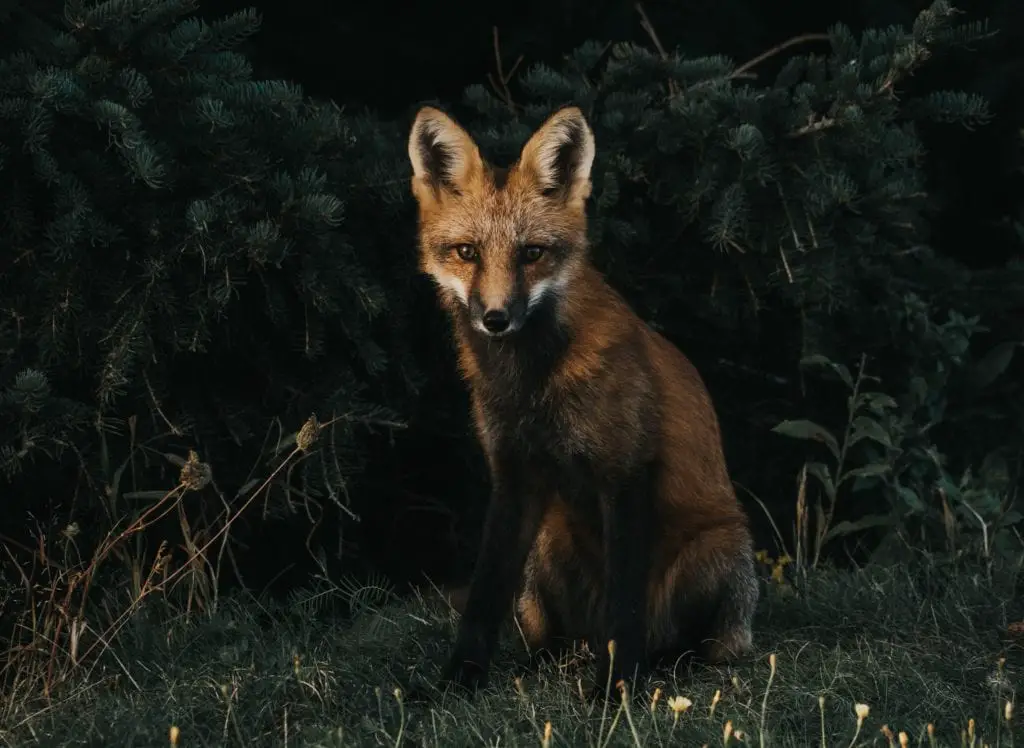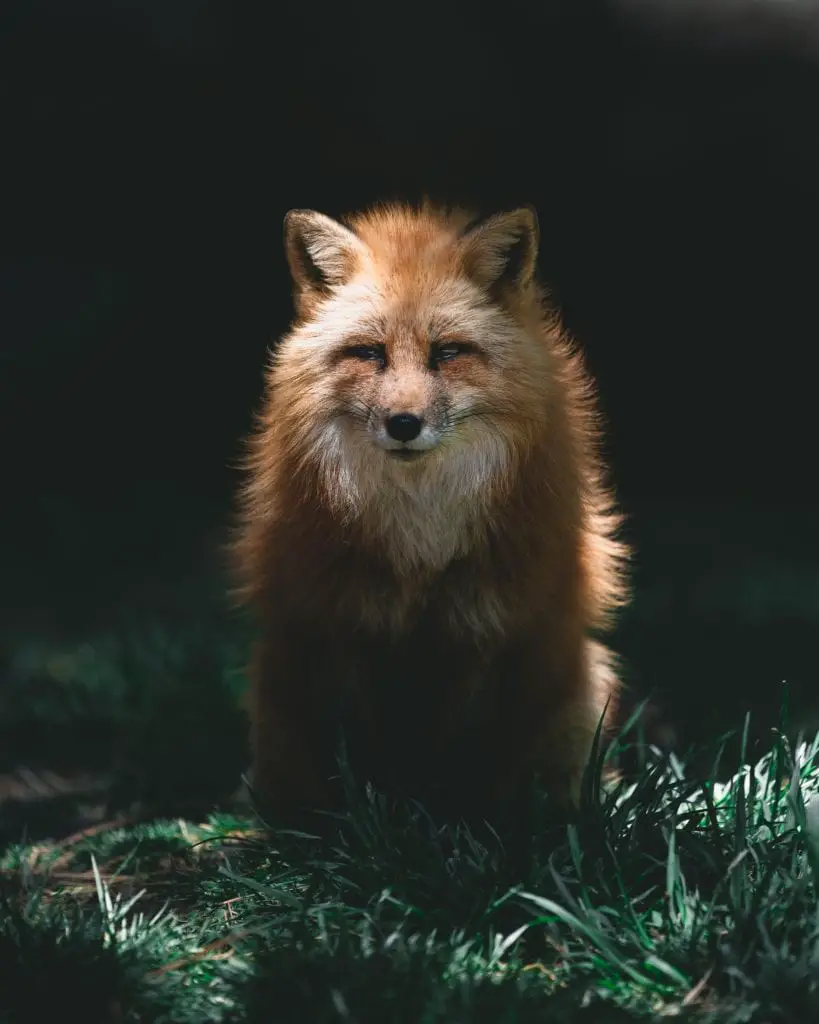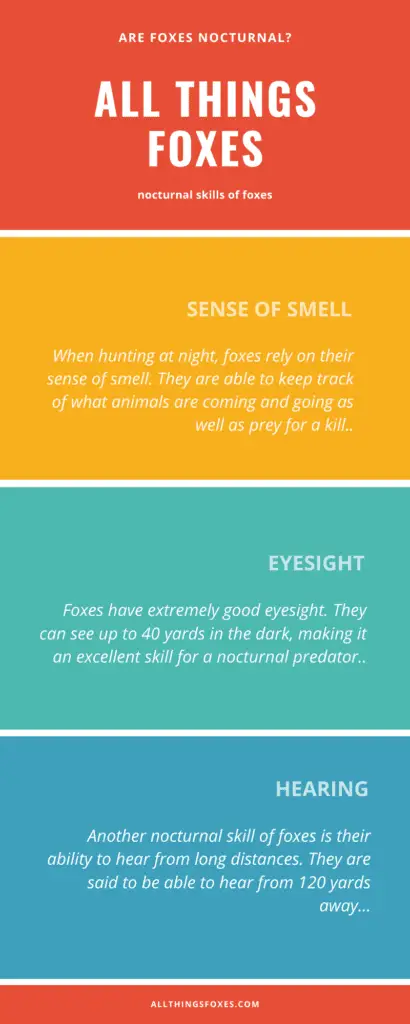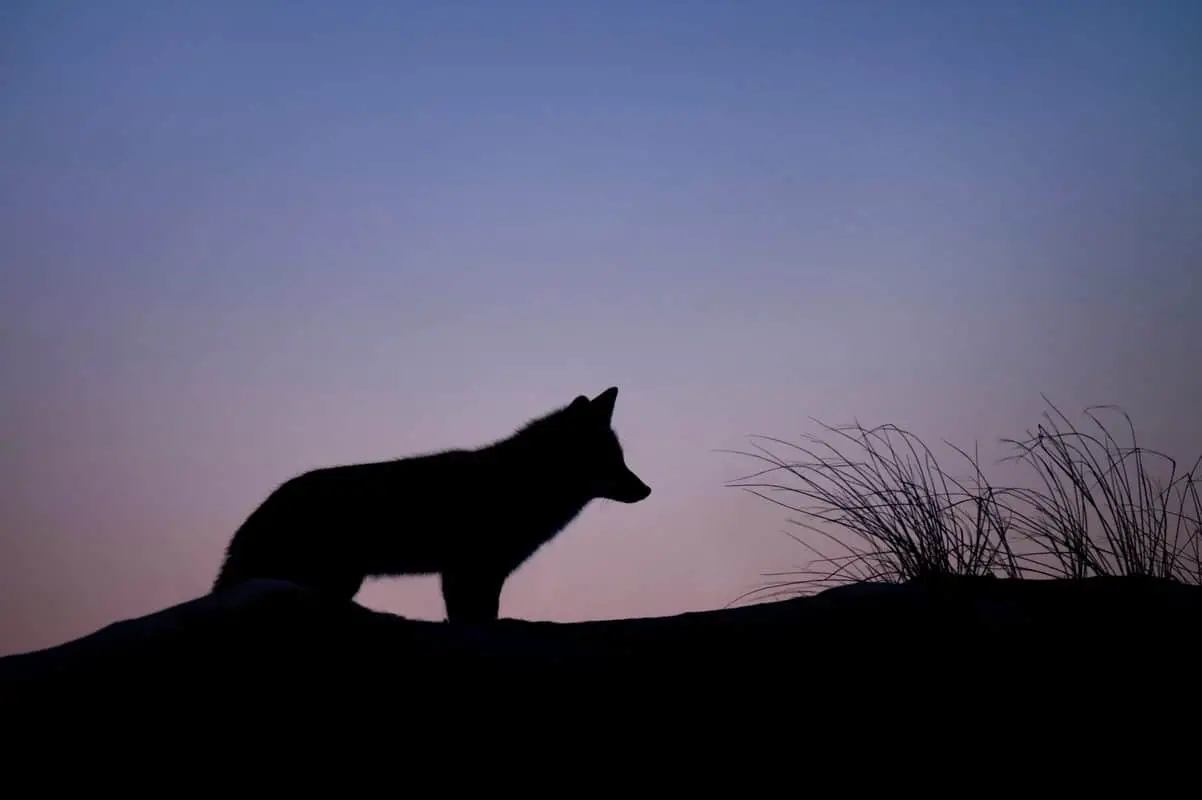Foxes are mysterious creatures; their nocturnal habits and behavior are very different from other animals. Wild foxes are solitary and usually stick to themselves. While they are in the Canidae family, they have developed their own unique habits that set them apart from other canids.
Are foxes nocturnal
Yes, foxes are mostly nocturnal. Foxes hunt at night and sleep during the day. They can also be crepuscular, going out at sundown and during twilight hours. Many animals that are nocturnal, are cross into other behaviors.
Foxes sleep during the day. They are very rarely active in the daylight hours.
Nocturnal Foxes Video
Recently foxes in urban areas, have been known to scavenge for food in the daylight hours because they are forced out of their wooded areas and must adapt their hunting habits to survive.
The fox can also be a crepuscular animal at times, coming out on cloudy days, usually for food. This can sometimes be confusing for people to identify their habits.
They are not social at all during the day, and just around dusk, you will hear their fox calls! Communicating with each other in the wilderness.
A Closer Look at the Foxes Nocturnal Habits
Foxes like to be alone and are solitary creatures. They do not mingle with other animals and keep to their own small family groups.
Baby foxes are born blind and stay blind for days before they can see. They must remain in the den, safe from predators and too much daylight.
Nocturnal Fox Behavior
They communicate with each other mostly by sound and scent. This is extremely useful for a nocturnal creature such as the fox. They will mark areas that they bury or hide their food with urine and return to them.
This makes for the perfect midnight snack!
Unfortunately, foxes can sometimes become preyed on in the dark. Other nocturnal animals higher up in the food chain, such as mountain lions and owls, sometimes get the drop on a fox at night.
Foxes Are Nocturnal Hunters
Since foxes are nocturnal, they do much of their hunting at night. They have excellent hearing and can navigate through the darkness to find their prey easily.
Most foxes can hear up to 120 yards away!
When it comes to food, foxes are omnivores, and since they mostly come out at night they count on their keen sense of smell to identify berries, roots, grubs, and prey such as mice and birds.
A fox usually only makes one or two kills a week, which is why many foxes appear so slim and lean. They are scavenger animals, and opportunistic. They will spend hours at night looking for a kill only to find a few grubs.
Fox Dens and Habitats
Foxes build semi-complex dens in the ground. Sometimes they inherit them from previous generations.
A fox den can sometimes have multiple openings, that give them access to the outside world and keeps them safe underground at night.
They can use their senses and hearing as alarm systems to dangers such as predators or natural events.
Foxes will also take on abandoned burrows from other animals, for emergency situations. Or if while hunting at night a fox gets caught out in a storm, it may steal a burrow temporarily.
Skills that help foxes survive at night:
| ✅ Sense of Smell ✅ Good Eyesight ✅ Great hearing |

What Kinds of Foxes are Nocturnal?
Are red foxes nocturnal? Yes, red foxes are nocturnal. Red foxes hunt at night and have incredible skills for capturing their prey.
They are one of the largest of the foxes and are able to hold their place in the food chain as a carnivorous predator.
Red foxes are great hunters they pounce on their prey and have a unique style of hunting.
Are gray foxes nocturnal? Gray foxes are nocturnal, like the other foxes they will also go out during cloudy days or during twilight but mostly hunt in the night.
Gray foxes are sometimes called tree foxes because they can climb trees, they are the only one of their species with that ability.
If they hear a nearby predator, they may jump into a tree to avoid detection. They count on these skills as well as speed in order to get away from other nocturnal predators in the night.
Are arctic foxes nocturnal? Arctic foxes are nocturnal. They are considered to be, nocturnal burrowers. They dig deep into the snow to find areas where they can dig beneath the dirt to burrow in.

Although it’s rare to see them during the day they can sometimes be forced to hunt in daylight hours when no nightly kills are fruitful.
They also tend to make their dens near sources of vegetation, helping them get through tough winter nights, eating plants that grow in the severe cold. (Earning their title of “clever fox“)
Are fennec foxes nocturnal? Yes, fennec foxes are nocturnal. Living in desert regions that are known to have vicious predators, fennec foxes must find ways to survive in the night. They are the smallest of the foxes and count on their swiftness and their large ears to hear trouble coming in the night time.

What Dangers are there for Foxes in the Night
Since foxes mostly hunt alone, they must hunt food for themselves and sometimes their family.
This puts them all alone in the wilderness to fend for themselves. Most foxes are very agile creatures and can navigate the wilderness with grace. There are always unseen threats, from other animals, and mother nature.
Most foxes do not live to the age of 2, because of the trials and tribulations of nature’s brutal tests.
The night can come with all kinds of dangers for the fox. Although the fox is well built to deal with danger, they sometimes can become preyed on or attacked by other animals.
Other Nocturnal Predators and Enemies of the Fox
One of the biggest threats to a fox at night is other nocturnal predators. Foxes hunt at the same time as many other bigger predators.
A fox in the wild at night might come across anything from bears to mountain lions, to other wild dogs.
Wild dogs travel in packs, unlike foxes. It can be a difficult battle if a fox gets attacked by a pack of dogs or even worse wolves.
How Foxes have Adapted
While foxes are nocturnal, they do sometimes come out during the day.
Old reports claim that to see a fox in the daylight means that it has a disease, like rabies or other health problems, which can sometimes be the case.
But now that animals are forced from their forests and homes due to human expansion it is much more common to see an urban fox out and about in the day.
Foxes have come along way on their journey through evolution. The red fox has crossed continents.
The Arctic fox is the only native animal to Iceland, which shows just how resilient they can be even in parts of the world that are frozen.
These foxes have a peculiar way of hunting in the dark and in the snow. Scientists now know that foxes use magnetic fields to triangulate their prey!
Foxes are able to see very well in the dark, they have tapetum lucidum, which allows them to see in the dark, much like cats.
This makes nocturnal hunting much easier for the fox. This combined with their good hearing and nose makes them a great predator.

Conclusion
Many fox information resources label foxes as “mostly nocturnal” and there is some truth to that, but the final answer is that they are nocturnal. Forced by other measures to move around in the day.
Hunting in twilight hours is also common for nocturnal creatures, who see cloudy days and sunsets as opportunities to catch a meal.
One thing is for sure, if you have ever camped our been in the wilderness during the night, you have most likely heard a fox.
Foxes are very vocal when they are out and social, sending signals to other foxes and continuing the hunt for survival.
All kinds of foxes are spectacular creatures, both day and night. No matter where in the world you are, a fox encounter can be a spiritual and calming moment.

See more about Fox Behavior.
Check out our PAWSOME new collection of Fox Gifts
Frequently Asked Questions
Are foxes active during the day?
Not usually. Foxes sleep during the day but have been seen in daylight hours.
Do foxes sleep in their dens?
Do they sleep in the dens? No, unless they are a pregnant female. Foxes use their dens for mating and raising kits.
Are foxes diurnal?
Are foxes diurnal? No, they are not. They sleep during the day.
Do foxes hunt at night?
Do foxes hunt at night? Yes, they do. Foxes are nocturnal hunters.

